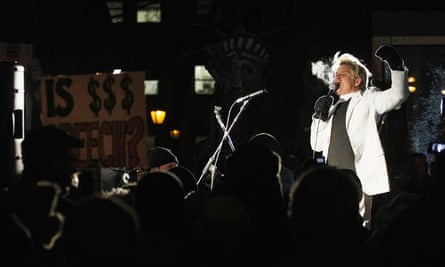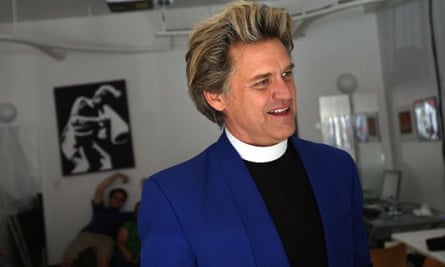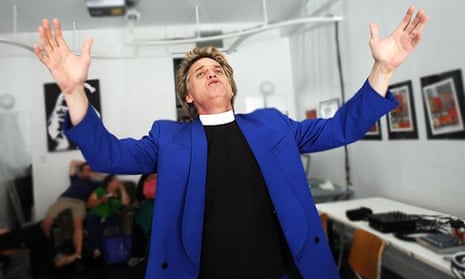Justin Bieber has pulled out of the Macy’s Thanksgiving Day parade. But don’t worry: the Reverend Billy is still planning to entertain the holiday crowd on Black Friday and maybe, just maybe, add a few Beliebers to his Church of Non-Shopping.
The holiday season is a busy time for Bill Talen – the performance artist, actor and activist who styles himself as Reverend Billy. Last week at Joe’s Pub, the downtown music venue where Adele recently performed three of her songs to an intimate crowd of 184 people, Talen was warming up for the big day.
About a dozen homeless New Yorkers – three of them under the age of five – took the stage with Talen to share their stories of being hassled for living on the street, of being arrested for blocking sidewalks with their carts.
“How can this happen in America?” asked a homeless retired marine, his voice trembling.
“Talk to us, don’t talk about us,” said another as the audience looked on silently. “I could be a decent person,” he added, which was met with echoes of “You are!”. Seconds later, he was enveloped in a hug from Talen.
The show may have been more than the audience bargained for. If homeless people are in the audience or up on the stage, you can’t avert your eyes or walk faster until you have passed them.
In a performance lasting just over an hour, Talen and his Church of Stop Shopping tackle GMOs, police brutality, racism, homelessness, capitalism, climate change and the environment. They are not there to give you a good show – they are there to make you question your way of life.
The Church of Stop Shopping has been around for 15 years. Talen first developed his Elvis-meets-Bill Graham preacher character in the alternative theaters of San Francisco. The character and the church soon morphed into a vehicle for protesting against what he sees as the destructive rise in consumerism. At first, the group was resisting “consumerism in the broadest sense”, says Talen. Then he identified targets.
Talen is banned from every Starbucks in the world after a series of protests against its “fake Bohemia” in which he tried to “exorcise” the demon of cookie-cutter capitalism from its stores. He’s been arrested outside Disney stores, where the group duct-tapped Mickey Mouse to a cross. Ten years ago the group began an annual tradition of staging a performance-like protest outside Macy’s flagship store in New York City.
But even for Talen some things are bigger than shopping. “Last year, for the first time in 10 years, we were not at the front door of Macy’s in Herald Square at the door buster event,” Talen says. “We were in Ferguson.”

After visiting a Monsanto headquarters in St Louis to perform another exorcism, the group traveled to Ferguson to participate in protests held just days after a grand jury in St Louis County declined to indict Darren Wilson for killing Michael Brown. The group also participated in die-ins at the local stores.
When Talen and Savitri D, his partner and director, describe that experience as moving and transformative. Just minutes into his show at Joe’s Pub, Reverend Billy announced that US has reached a landmark – about 1,000 people have been killed by police in 2015.
The church – or the choir, if you will – then launched into one of their songs, Man Down, Brother Down. Moments later, a member of the choir began to the list names of those who have been killed: Michael Brown, Oscar Grant, Corey Jones, Walter Scott, Freddie Gray, Trayvon Martin. A moment of silence followed. The only sound was that of drinks clinking on servers’ trays.
The show, which will run every Sunday until 20 December, is not all about being uncomfortable.
“Do you feel her presence?” Reverend Billy says at one point, referring to Adele. He continues, singing: “Rumor has it …”
Talen likes to mix the sacred and the profane – he sees it as a way to remove the barriers he believes people erect to stop them questioning their unbridled consumerism.
When people protest or attend a performance, “we start to meet in the streets again,” says Talen. These interactions come after years of people distancing themselves from each other. “I distance myself from you. I keep buying and buying and buying. Everything around me is monetized and you go farther away as a person. You start to have more and more cars and perfumes and multiple phones, screens and billboards and [you are] way over there – we used to be within hailing distance, within talking distance, within touching distance.”
It all changed in Ferguson, he says: “We were laying down together. We were dying in together. We were touching each other in new ways. We were talking. We were making new relationships.”
“It’s not surprising,” adds Savitri D. “Social movements – or movements, period – of the last couple of decades, they all originate or come from people who really cannot shop or don’t shop. That are cut off or divorced from consumerism because the aspirational model is impossible for them.”
“That’s what Thanksgiving has to become this year,” Reverend Billy chimes in. “We have got to celebrate the soft, deep emotions: graciousness, trust, intimacy …”
“Gratitude,” says Savitri D.
“… Forgiveness, being quiet together without football on or video games.”
“How do you resist?” says Savitri D. “It’s really easy to find yourself in a store buying something you didn’t even need.”

This Friday, Reverend Billy and the Church of Stop Shopping will return to its old stomping ground, the Herald Square Macy’s on 34th street in New York, to urge people to – what else – stop shopping.
The church’s shooting and shopping protests are closely aligned, at least in Talen’s head. “Hands up, don’t shop,” was shouted many times in Ferguson, he said. It’s all part of his struggle with “this shared hallucination in the United States, this national fundamentalist religion, which could be expressed in a phrase ‘Shoot and buy, shoot and buy, shoot and buy’.”
“The main ritual in our society right now is shopping,” explains Talen. “It’s the national religion. It’s the thing we all do that we don’t even question any more. That’s how fundamental religions are – you don’t even question any more and if somebody does anything a little bit different, it’s very weird. He is a stranger. He is a threat.”
So while Bieber will not be singing at this year’s Macy’s Parade, Talen and the choir will be there the following day to treat its customers to anti-shopping choral performance. “We will exorcize this big department store, so that its products tremble on the shelves, but we won’t go flash mobbing inside like former years. The carbon emissions and sweatshop labor of their Black Friday sales will be sung to passersby.”
Corporations “have taken Thanksgiving utterly!” Talen said. He’s hoping he can take a little back.

Comments (…)
Sign in or create your Guardian account to join the discussion